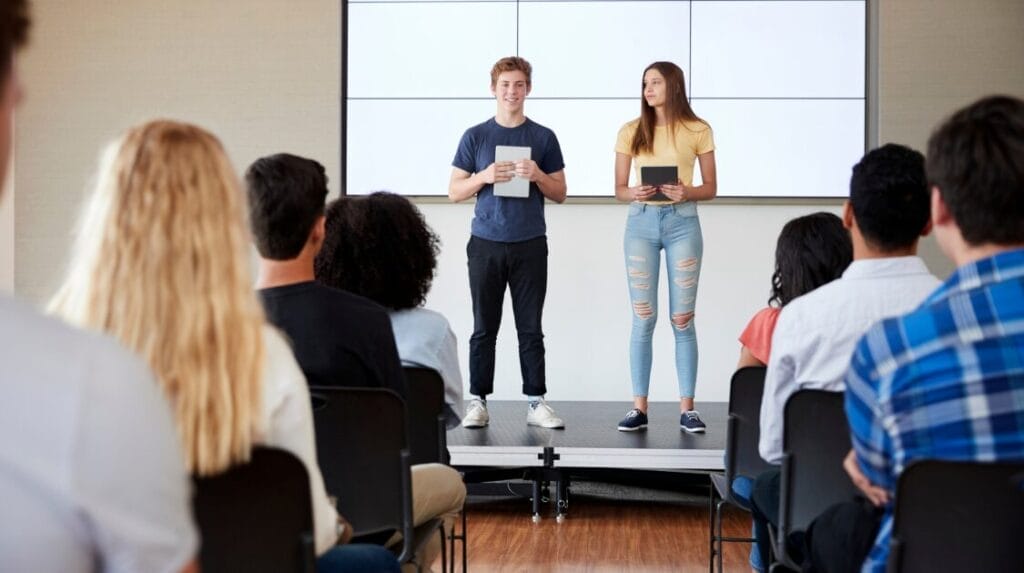
Have you ever had an idea and thought to yourself, “I should patent this”? Then a few years later, you saw your idea on a late-night infomercial? Humans, by nature, are creative: we look at the world, identify challenges, and develop solutions. We are born to innovate, from finding a way to open a soda can without breaking a nail to developing self-driving cars.
However, the current education system, from preschool to graduate school, doesn’t focus much on teaching us how to turn our dreams, inventions, or brands into reality. That’s why we’re excited to bring the Invention Convention Worldwide to Arizona!
What is the Invention Convention Worldwide?

Photo: Youth Inventors at The Henry Ford during RTX Invention Convention U.S. Nationals, photo by The Henry Ford
The Henry Ford Invention Convention Worldwide (ICW) is an international program that allows Kindergarten through 12th-grade students to identify challenges and create solutions by inventing something new. Students pitch their ideas at local, regional, state, and national competitions. They work through the invention process, which is similar to design thinking or the engineering design process. Through this process and pitching their ideas, students learn and apply problem identification, creative problem-solving, and research skills. They also learn to fail forward and present their ideas clearly and concisely.
The convention is helping to reach diverse student populations who are ready to tackle real-world problems. Together with educators, students, and parents who are passionate about inclusive invention education, ICW is shaping future innovators who will make a meaningful difference in the world.
The Impact of Invention Education
ICW is part of a larger international movement around the Invention Education model. This approach allows students to authentically apply what they have learned in school to create solutions to problems they identify. It encourages them to reach beyond their current grade level skills and learn what they need to make their solutions work.
The Invention Education model brings wonder and joy back into learning. Students are no longer just learning to pass a test. They see the practical application of what they are learning, understand why it matters, and are empowered to expand their knowledge beyond what they are being taught in the classroom.

Why the Invention Education Model is Important
The existing educational model is not working for many modern learners. The success of an educational model would provide equal opportunity and results among all schools and all students in all socioeconomic classes. The fact that this is not the case is evidence that a change is due. A recent study by the Pew Research Center found that students in high-poverty schools are falling further behind their peers in low-poverty schools. Many factors contribute to this gap, including underqualified teachers, overcrowded classrooms, and stress students may face at home.
Programs like Invention Convention Worldwide are new and innovative answers to these long-standing and growing problems. The Invention Education model is showing promise in improving student learning and attitudes towards learning, especially among girls and minority students in STEM fields. Studies in Korea and Georgia (US) show the potential long-term impact of Invention Education. This focus is relatively new compared to the broader field of education, but the early results from the research are promising.
In addition to ICW, the organization has created the Invention Convention Curriculum. This curriculum uses a framework that follows the seven steps of the invention process. It includes introductory lessons to help students get started. It also introduces students to entrepreneurial concepts to get them thinking about what happens beyond the invention process.
The United States is facing a creativity crisis. While IQs are increasing, the ability to creatively solve problems is decreasing. Students can learn information and pass tests, but they struggle to apply what they have learned to new and novel situations. True learning is not about rote memorization for a standardized test; it’s about being able to take what you have learned and apply it in a brand-new circumstance.
Addressing Broader Issues
Students often face anxiety when thinking about the environment and how current practices affect it. Empowering students to make positive changes decreased anxiety and helped them feel more hopeful about the future. Invention Education takes that a step further. Not only can students organize a clean-up of their local beach or park, but they can also invent a device to control or prevent litter in the first place!
Invention Education programs like Invention Convention Worldwide provide teachers, parents, and youth leaders with the training and resources they need to implement Invention Education in their classrooms and programs, regardless of age, gender, class, topic, or learning ability. Invention Education has the potential to be the “great equalizer” we have been looking for in education, business, and socio-economic fields.

How You Can Get Involved
This graphic shows barriers to innovation across Arizona. Blues indicate the least barriers, while the other colors identify communities with the most barriers. As you can see, Arizona is mostly gray and orange. This is important because of the potential for “lost Einsteins,” students who miss out on opportunities to invent because of a lack of resources and opportunities. If you’re a parent, teacher, youth leader, or anyone involved in educating K-12 students in any way, you have the power to reduce barriers to innovation.
Edson E+I Institute is excited to bring the Invention Convention Worldwide to Arizona and help make progress in the future of innovation in Arizona! Arizona’s program is open to all K-12 youth through participating schools, youth organizations, and homeschool groups. Reach out to our team at [email protected] to learn more. If your school, youth organization, or homeschool group is not participating, contact our team to get started. If you are not in Arizona, find your state Invention Convention affiliate here.
If you’d like to learn more about Edson E+I’s Youth Entrepreneurship opportunities, reach out to us here.
Together, we can inspire the next generation of inventors and problem-solvers and remove the barriers to innovation!


